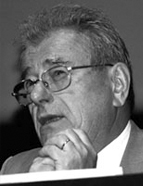

Some of Jacques Marcadé's works were used both to prepare his doctorate and to carry out further studies based on two logical lines: sociology— religious and otherwise— and the spiritual doctrine. Une comarque portugaise— Ourique — entre 1750 et 1800 (1971) [A Portuguese county— Ourique — between 1750 and 1800] is a nourishing study of regional history that analyses property in order to classify social entities: the landed nobility, whether or not linked to the military orders, the wealthy "farmers" ("rural capitalists"), the sharecroppers, the labourers and, until 1773, the slaves. After that, Marcadé occupied himself mainly with religious life, demystifying the counts of both the Voyage du ci-devant duc de Châtelet [Voyage of the former Duke of Châtelet] as well as Balbi's, concluding that the clergy only accounted for 1.2 percent of the region's population. The monograph ends with an analysis of economic life by using the answers provided by the parishes to the questionnaire drawn up for the Dicionário geográfico [Geographical Dictionary]. In Le jansénisme au Portugal (1980) [Jansenism in Portugal], Jacques Marcadé estimated that the influence of Jansen's thought was limited in 18th century Portugal, and that there was a confusion between this current and the anti-Jesuitism linked to Pombal's policy against the Company and the preference given to the Congregation of the Oratory. He carried out an exhaustive survey of the inclusion of Portugal in the Jansenist Nouvelles ecclésiastiques [Ecclesiastical novels], which is of little significance apart from the reference to the publication of the translation of Catéchisme de Montpellier [Catechism of Montpellier] and the book's success, as well as the work of António Pereira de Figueredo, and more specifically his Demonstração Theologica [...] do direito dos Metropolitanos de Portugal para confirmar e mandar sagrar os Bispos suffraganeos nomeados pela Sua Magestade [Theological demonstration [...] of the right of the Metropolitans of Portugal to confirm and have consecrated the suffragan Bishops appointed by His Majesty], published in 1769. Once again, Marcadé evokes Cenáculo, whose regalist position with Gallic roots would be his only— and minor— trace of Jansenism. And finally, relying on António Coimbra Martins, he characterises this movement as a true aspect of the last phase of the Luzes [Enlightenment]. Despite the title, in his 1987 work L’épiscopat portugais et la Révolution Française [The Portuguese episcopate and the French Revolution], Jacques Marcadé rejects the very notion of the "episcopate" when it comes to Portugal, where the high clergy, he wrote, was not an aristocratic bloc educated in seminaries like in France, but rather a mosaic of bishops from different social backgrounds and diverse educational backgrounds. He concludes by stating: "au Portugal, il n’y pas une école, mais des sensibilités différentes; il n’y a pas cette uniformité [...] du haut-clergé français." [In Portugal there is no single school, but rather different sensitivities; there is no such uniformity [...] of the high French clergy].
This work is financed by national funds through FCT - Foundation for Science and Technology, I.P, in the scope of the projects UIDB/04311/2020 and UIDP/04311/2020.
